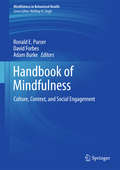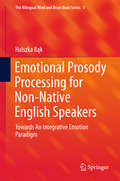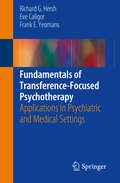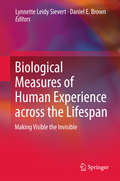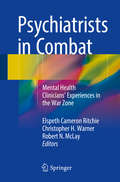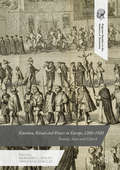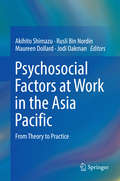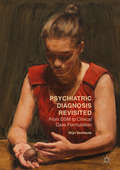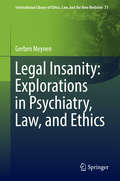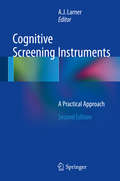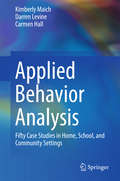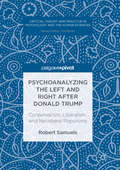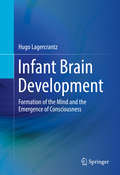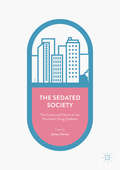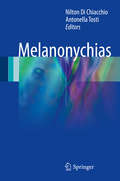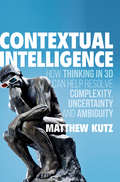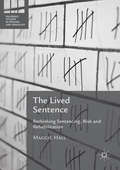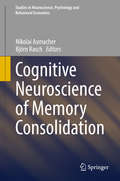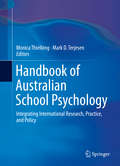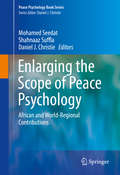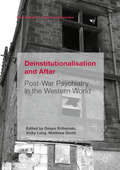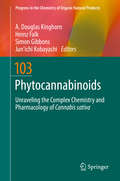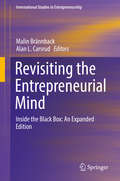- Table View
- List View
Mental Health Uncertainty and Inevitability
by Hugh Middleton Melanie JordanThis book offers original knowledge, debate, and understanding from frontline fieldwork data and the relations between mental health difficulties, mental healthcare provision, and social theory. Dominant discourse of the last half century has followed a medical perspective. This has marginalised contributions from social science. Furthermore purely medical approaches to mental healthcare have profound shortcomings. Thus, this book draws upon innovative research findings to rejuvenate the relationship between psychiatry and social science. It frames this by reference to certain inevitable and uncertain elements of mental health which characterise this field. Over nine chapters the volume is a unique contribution to several intersecting areas of intellectual enterprise, research, and learning -- as well as a source of insight into how mental health practice and policy might be modified and improved. As a result, it appeals to a wide range of audiences including social scientists, mental health practitioners, mental health researchers, social theorists, mental health service users, and policy-makers.
Handbook of Mindfulness: Culture, Context, and Social Engagement (Mindfulness in Behavioral Health)
by David Forbes Adam Burke Ronald E. PurserThis handbook explores mindfulness philosophy and practice as it functions in today’s socioeconomic, cultural, and political landscape. Chapters discuss the many ways in which classic concepts and practices of mindfulness clash, converge, and influence modern theories and methods, and vice versa. Experts across many disciplines address the secularization and commercialization of Buddhist concepts, the medicalizing of mindfulness in therapies, and progressive uses of mindfulness in education. The book addresses the rise of the, “mindfulness movement”, and the core concerns behind the critiques of the growing popularity of mindfulness. It covers a range of dichotomies, such as traditional versus modern, religious versus secular, and commodification versus critical thought and probes beyond the East/West binary to larger questions of economics, philosophy, ethics, and, ultimately, meaning.Featured topics include:A compilation of Buddhist meditative practices.Selling mindfulness and the marketing of mindful products.A meta-critique of mindfulness critiques - from McMindfulness to critical mindfulnessMindfulness-based interventions in clinical psychology and neuroscience.Corporate mindfulness and usage in the workplace.Community-engaged mindfulness and its role in social justice.The Handbook of Mindfulness is a must-have resource for clinical psychologists, complementary and alternative medicine professionals/practitioners, neuroscientists, and educational and business/management leaders and policymakers as well as related mental health, medical, and educational professionals/practitioners.
Emotional Prosody Processing for Non-Native English Speakers
by Halszka BąkThis volume provides the first systematic and data-driven exploration of English emotional prosody processing in the minds of non-native speakers of the language. Over the past few decades emotional prosody has attracted the interest of researchers from a variety of disciplines such as psychiatry, neuropsychology, psycholinguistics, and linguistics. Although a considerable collective body of empirical evidence exists regarding emotional prosody processing in native speakers of various languages, non-native speakers have been virtually ignored. This constitutes a knowledge gap of increasing relevance, as we approach 2050, the year when the global population of non-native speakers of English is estimated to overtake that of native speakers of the language. This volume aims to fill this gap and provide insights into how emotions are processed on multiple levels while also presenting novel methodological solutions. Crucially, "Emotional Prosody Processing for Non-Native English Speakers: Towards an Integrative Emotion Paradigm" begins by providing a conceptual background of emotion research, and then demonstrates a novel, workable, completely integrative paradigm for emotion research. This integrative approach reconciles theories such as the dimensional view of emotions, the standard basic emotions view, and the appraisal view of emotions. Following this theoretical section is an empirical exploration of the topic: the volume explores those views via experimental tasks. The insight into overall processing such a multiple-level approach allows a comprehensive answer to the question of how non native speakers of English process emotional prosody in their second language. By offering a critical, data-driven, integrative approach to investigating emotions in the minds of non-native English speakers, this volume is a significant and timely contribution to the literature on emotion prosody processing, bilingual research, and broadly understood emotion research.
Fundamentals of Transference-Focused Psychotherapy
by Richard G. Hersh Eve Caligor Frank E. YeomansThis book offers clear, practical, and simple recommendations for treating patients with personality disorders. The goals of the book are twofold: 1) to describe the essential elements of Transference-Focused Psychotherapy (TFP), an evidence-based treatment for Borderline Personality Disorder, and 2) to describe how core principles and techniques of TFP can be used in a variety of settings to improve clinical management of patients with a broad spectrum of personality pathology, even when patients are not engaged in individual psychotherapy. A short introduction outlines in concise language the core elements of TFP and its origins in object relations theory. The book then takes the clinician through the process of: 1) comprehensive diagnosis, 2) negotiation of the treatment frame, and 3) the overarching strategies, techniques, and tactics used in the individual treatment, including helpful, accessible clinical vignettes. Subsequent chapters build on the literature of TFP in individual psychotherapy, broadening its applications to include crisis management, family engagement, inpatient psychiatry, pharmacotherapy, medical settings, psychiatry residency training. Fundamentals of Transference-Focused Psychotherapy is a valuable resource for psychiatrists, psychologists, and all other medical professionals treating patients suffering from Borderline Personality Disorder, and other severe personality disorder presentations.
Biological Measures of Human Experience across the Lifespan: Making Visible the Invisible
by Daniel E. Brown Lynnette Leidy SievertThe proposed volume explores methods used by social scientists and human biologists to understand fundamental aspects of human experience. It is organized by stages of the human lifespan: beginnings, adulthood, and aging. Explored are particular kinds of experiences - including pain, stress, activity levels, sleep quality, memory, and menopausal hot flashes - that have traditionally relied upon self-reports, but are subject to inter-individual differences in self-awareness or culture-based expectations. The volume also examines other ways in which normally "invisible" phenomena can be made visible, such as the caloric content of foods, blood pressure, fecundity, growth, nutritional status, genotypes, and bone health. All of the chapters in this book address the means by which social scientists and human biologists measure subjective and objective experience.
Psychiatrists in Combat
by Elspeth Cameron Ritchie Christopher H. Warner Robert N. MclayThis book tells the professional and personal experiences of American military psychiatrists and their colleagues in the longest conflict in American history. These highly trained men and women treat service members for the psychological consequences from their experiences in battle, including killing enemy combatants; seeing wounded and killed civilian casualties; losing their friends in combat; factoring in personal mental health needs, including psychiatric drug treatment; and potentially dealing with their own physical injuries from being shot or blown up. The volume consists of 20 short first-person case studies from the mental health providers who have been risking their lives while treating patients in the battlefield since 9/11. Written by expert psychiatrists who have experienced these challenges directly, this texts offers both a clinical and personal account that is not found anywhere else. Topics include tips on providing psychotherapy in battle, evaluating and treating detainees in war prisons such as Abu Ghraib and Guantanamo Bay, and the unique challenges of prescribing medication to patients who are also comrades in war. Psychiatrists in Combat is uniquely positioned to be a valuable resource for psychiatrists interested in trauma and veterans, psychologists, social workers, occupational therapists, military health personnel, and mental health professionals interested in military psychiatry.
Emotion, Ritual and Power in Europe, 1200–1920: Family, State and Church (Palgrave Studies in the History of Emotions)
by Katie Barclay Merridee L. BaileyThis volume spans the fourteenth to nineteenth centuries, across Europe and its empires, and brings together historians, art historians, literary scholars and anthropologists to rethink medieval and early modern ritual. The study of rituals, when it is alert to the emotions which are woven into and through ritual activities, presents an opportunity to explore profoundly important questions about people’s relationships with others, their relationships with the divine, with power dynamics and importantly, with their concept of their own identity. Each chapter in this volume showcases the different approaches, theories and methodologies that can be used to explore emotions in historical rituals, but they all share the goal of answering the question of how emotions act within ritual to inform balances of power in its many and varied forms. Chapter 5 of this book is available open access under a CC BY 4.0 license.
Educational Psychology Practice
by Thomas Szulevicz Lene TanggaardThis book sets out a proposal for applying psychological and educational psychology concepts to improve work with children and young people. It also suggests how some of the criticism aimed at pedagogical-psychology practice can be answered. In several respects educational psychology practice seems to be in a transition phase and could even be said to be suffering an identity crisis: educational establishments and education policy alike are looking for different skills than those the psychology profession traditionally provides, and people are generally questioning the relevance and applicability of pedagogical-psychological counseling. The book is based on the fundamental premise that good professional practice is contingent upon circumstances that allow practitioners to apply their knowledge, experience and skills in the specific encounter with a specific task. This means that the ability to act pragmatically and creatively is, and will increasingly be, an important skill not only for educational psychologists, but also for psychologists in general. In other words, psychologists must be able to contribute to tasks in new ways and new contexts when required. Intended primarily for students of psychology, school psychologists and other professional groups that provide counseling in schools, the book is also a valuable resource for the various groups that use pedagogical-psychology tools and insights in their work with children and young people.
Psychosocial Factors at Work in the Asia Pacific
by Akihito Shimazu Rusli Bin Nordin Maureen Dollard Jodi OakmanThe past several decades of rapid organizational change and global economic activity beseech a fresh understanding of work conditions and mental health across all nations and regions. This volume addresses psychosocial factors at work, legislation, frameworks, research innovations and common perceptions in the Asia Pacific countries. It presents new research on psychosocial factors at work from an Asia Pacific perspective, introducing exciting new research on workaholism, bullying, work-life balance and conflict, work demands classifications, and psychosocial safety climate. Insights regarding workplace psychosocial factors, worker health and well-being have evolved mainly within North American and European cultural contexts and developed industrial countries. This state of the art account of knowledge development in the Asia Pacific region will stimulate new insights for researchers and policy makers to improve the quality of workers' lives worldwide. "This very informative book highlights the significance and uniqueness of job stress problems encountered by workers of different countries in the Asia Pacific region. Occupational health researchers all around the world will find this book a great inspiration for future research. " Yawen Cheng, ScD, Institute of Health Policy and Management, Taiwan "Initiatives and interventions reported from collaborative projects present useful hints for filling gaps in policies and practices for managing psychosocial risk factors in diverse work-life situations in the Asia Pacific region". Dr. Kazutaka Kogi, President, International Commission of Occupational Health
Psychiatric Diagnosis Revisited
by Stijn VanheuleThis book explores the purpose of clinical psychological and psychiatric diagnosis, and provides a persuasive case for moving away from the traditional practice of psychiatric classification. It discusses the validity and reliability of classification-based approaches to clinical diagnosis, and frames them in their broader historical and societal context. The Diagnostic and Statistical Manual of Mental Disorders (DSM) is used across the world in research and a range of mental health settings; here, Stijn Vanheule argues that the diagnostic reliability of the DSM is overrated, built on a limited biomedical approach to mental disorders that neglects context, and ultimately breeds stigma. The book subsequently makes a passionate plea for a more detailed approach to the study of mental suffering by means of case formulation. Starting from literature on qualitative research the author makes clear how to guarantee the quality of clinical case formulations.
Legal Insanity: Explorations in Psychiatry, Law, and Ethics
by Gerben MeynenThis book examines core issues related to legal insanity, integrating perspectives from psychiatry, law, and ethics. Various criteria for insanity are analyzed and recommendations for forensic psychiatric and legal practice are offered. Many legal systems have an insanity defense, in one form or another. Still, it remains unclear exactly when and why mental disorders affect a person's moral or criminal responsibility. Questions addressed in this book include: Why should insanity be a component of our legal system? What should be the criteria for an insanity defense? What would be the reasons for abolishing it? Who should bear the burden of proof? Furthermore, the book discusses the impact neurosciences may have on psychiatric and psychological evaluations of defendants as well as on legal decisions about insanity.
Cognitive Screening Instruments: A Practical Approach
by A. J. LarnerCognitive Screening Instruments: A Practical Approach provides a practical and structured overview of some of the most commonly used and easily available cognitive screening instruments applicable in the outpatient clinic and bedside setting. Dementia and cognitive disorders are now recognised as an increasing public health problem, both in terms of patient numbers and cost, as populations age throughout the world. Despite this, many patients with dementia never receive a formal diagnosis, with implications for their appropriate care and management. Diagnostic tests which identify cases of dementia therefore have an important role. Expert authors from around the world equip the reader of Cognitive Screening Instruments: A Practical Approach with clear instructions on the usage of each screening instrument, its strengths and weaknesses, the time required for administration, and rules on scoring, such as how to correct for variations in the patient's age or education, and suggested cut-off scores. Cognitive Screening Instruments: A Practical Approach is a handy, illustrated guide and a valuable diagnostic aid for practitioners working closely with patients with dementia and mild cognitive impairment. This volume will be of use both to clinicians and to professionals in disciplines allied to medicine who are called upon to assess patients with possible cognitive disorders, including neurologists, old age psychiatrists, neuropsychologists, primary care physicians, dementia support workers, and members of memory assessment teams.
Applied Behavior Analysis: Fifty Case Studies in Home, School, and Community Settings
by Darren Levine Kimberly Maich Carmen HallThis textbook offers real-world case studies for using Applied Behavior Analysis (ABA) to create, implement, and appraise behavior intervention programs across a variety of client situations. Its chapters are formatted for ease of use and retention and organized to focus on the core components of ABA: assessment, planning, implementation, evaluation, and research/ethics. Illustrative cases represent a diversity of problem behaviors, settings, social contexts, and life stages, and includes questions about data collection, goal setting, communication with families, and other processes of effective ABA practice. Together they emphasize not only the content knowledge involved in designing interventions, but also the interpersonal skills necessary for helping change complex challenging behaviors. These fifty case studies: Are suited to individual or team training. Present guiding questions regarding ABA process and professional practice. Feature charts, forms, templates, and other practical tools. Include links to Behavior Analyst Certification Board resources. Demonstrate the flexibility of ABA for use with children, adolescents, adults, or seniors. Applied Behavior Analysis: Fifty Case Studies in Home, School, and Community Settings is an essential text for graduate students, researchers, and practitioners in child and school psychology, behavior analysis, learning and instruction, counseling, and education. This singular volume models critical thinking and professional development in keeping with best practices and professional standards.
Psychoanalyzing the Left and Right after Donald Trump
by Robert SamuelsThis book outlines a new model for global social justice movements that is based on Freud and Lacan's central insights regarding the unconscious, repetition, drives, and transference. Since most of our current social issues are global in nature, Bob Samuels convincingly argues that we need a global solution, but that global solidarity is blocked by narcissistic nationalism and the capitalist death drive. In examining contemporary social movements for global justice, Samuels articulates a comprehensive theory of non-pathological social solidarity, and argues that in the age of multinational corporations and global climate change, we need a new model of global justice and government that requires an understanding of analytic neutrality and free association. This book uses psychoanalytic theories and practices to explain how someone like Trump can rise to power, and explores why liberals have failed to provide a convincing or effective political alternative. It will be compelling reading to students and teachers in a range of psychological and political disciplines, and to anyone interested in psychoanalysis and current politics.
Infant Brain Development
by Hugo LagercrantzThis book discusses the main milestones of early brain development and the emergence of consciousness, within and outside the mother's environment, with a particular focus on the preterm infant. These insights offer new perspectives on issues concerning fetal pain, awareness in newborns, and the effects of current digital media on the developing infant brain. Among the topics covered: #65533; Brain patterning, neural proliferation, and migration. #65533; The stress of being born and first breaths. #65533; The stream of consciousness. #65533; Parenting and stimulating the brain of the child. #65533; The moral status of the fetus and the infant. Infant Brain Development is an excellent resource for researchers, clinicians and related professionals, and graduate students across a variety of disciplines including developmental psychology, pediatrics, neurobiology, neuroscience, obstetrics, nursing and medical ethics. It is written with historic and philosophical remarks of interest for a broad readership. --- "This book is a joy to read for anyone interested in understanding where biology is heading in the 21st century, and it is essential for those who work in child development. " Eric Kandel, University Professor, Columbia University, Co-Director, Mortimer B. Zuckerman Mind Brain Behavior Institute, Nobel Laureate in Medicine 2000 "With the precision of a scientist, the depth of a philosopher, and the heart and sensitivity of a pediatrician, Hugo Lagercrantz weaves a story as readable and engrossing as any mystery novel, linking brain, genes, the environment, and behavior to explain the development of the mind of a newborn. A tour de force!" Patricia K. Kuhl, The Bezos Family Foundation Endowed Chair in Early Childhood Learning, Co-Director, Institute for Learning & Brain Sciences, University of Washington "This book is a noble and valiant effort by Dr. Lagercrantz to explain the immensely complex issue of normal and pathological development of the human brain in simple terms that are accessible to the general public. " Pasko Rakic, Duberg Professor of Neuroscience and Neurology, Yale University School of Medicine
The Sedated Society
by James DaviesThis edited volume provides an answer to a rising public health concern: what drives the over prescription of psychiatric medication epidemic? Over 15% of the UK public takes a psychiatric medication on any given day, and the numbers are only set to increase. Placing this figure alongside the emerging clinical and scientific data revealing their poor outcomes and the harms these medications often cause, their commercial success cannot be explained by their therapeutic efficacy. Chapters from an interdisciplinary team of global experts in critical psychopharmacology rigorously examine how pharmaceutical sponsorship and marketing, diagnostic inflation, the manipulation and burying of negative clinical trials, lax medication regulation, and neoliberal public health policies have all been implicated in ever-rising psycho-pharmaceutical consumption. This volume will ignite a long-overdue public debate. It will be of interest to professionals in the field of mental health and researchers ranging from sociology of health, to medical anthropology and the political economy of health.
Melanonychias
by Antonella Tosti Nilton Di ChiacchioThe purpose of this book is to guide the dermatologist and the general physician in the differential diagnosis and treatment of melanonychias. Melanonychia is a longitudinal pigmentation of the nail and it is considering a common presenting problem in general dermatology. The differential diagnosis varies from subungual hematoma to a fungal infection to a melanocytic lesion (hypermelanosis, lentigo, nevus, and melanoma) among others. Melanonychia may also indicate an early stage of nail melanoma, and its diagnosis remains a challenge among dermatologist. A recent publication on Dermatologists accuracy in early diagnosis of melanoma of the nail matrix showed that in situ melanoma of the nail matrix is very difficult for dermatologists to diagnose, regardless of the level of their experience. On Melanonychias the reader will find a complete discussion about all the most important topics on this condition, since its basic aspects (such as nail anatomy and epidemiology) until applied topics (including clinical features, nail biopsy and treatment).
Contextual Intelligence: How Thinking in 3D Can Help Resolve Complexity, Uncertainty and Ambiguity
by Matthew KutzThis book offers a structured framework for critical thinking and decision making that shows how to use hindsight, insight, and foresight to navigate through complexity. Every organization and every person faces rapid change and complexity. Contextual intelligence - understanding fully the context in which one is operating - teaches the reader how to navigate that complexity and respond appropriately in the face of change (expected and unexpected). The Three-Dimensional (3D) Thinking(tm) framework helps structure critical thinking by showing how to appropriately bring past experience, present intuition, and future ambiguity- in other words: hindsight, insight, and foresight - to bear on any given problem. Kutz offers a way to rationally organize difficult concepts such as complexity, tacit knowledge, and synchronicity into usable and understandable language, but more importantly teaches the reader how to apply these concepts in a very practical and meaningful way with measurable and tangible outcomes. The book also describes in detail 12 behaviors associated with contextual intelligence. Four behaviors are associated with hindsight, four behaviors are associated with insight, and four behaviors are associated with foresight. The book takes the reader through the 12 behaviors and how they relate to 3D Thinking. Cases and anecdotes are used generously to provide examples. Chapters are followed by critical thinking questions and questions related to the cases in the chapters. Furthermore, questions and practical tools are introduced that help the reader assess and determine their level of contextual intelligence.
The Lived Sentence
by Maggie HallThis book examines the lives of the sentenced to argue that 'sentencing' should be re-conceived to consider the human perspective. It combines a range of modern criminological and legal theories together with interviews with prisoners in New South Wales, to examine their lives during and beyond completing the terms of imprisonment, for a more continuous and coherent perspective on the process of 'sentencing'. This book makes a strong argument for the practical advantages of listening to the voices of the sentenced and it is therefore a useful tool for the correctional community engaged in providing services and programmes to reduce recidivism. A methodological and well-researched text, this book will be of particular interest to scholars of criminal justice and the penal system, as well as policy makers and practitioners.
Cognitive Neuroscience of Memory Consolidation (Studies in Neuroscience, Psychology and Behavioral Economics)
by Nikolai Axmacher Björn RaschThis edited volume provides an overview the state-of-the-art in the field of cognitive neuroscience of memory consolidation. In a number of sections, the editors collect contributions of leading researchers . The topical focus lies on current issues of interest such as memory consolidation including working and long-term memory. In particular, the role of sleep in relation to memory consolidation will be addressed. The target audience primarily comprises research experts in the field of cognitive neuroscience but the book may also be beneficial for graduate students.
Handbook of Australian School Psychology
by Monica Thielking Mark D. TerjesenThis handbook addresses the current state and practice of school psychology with a focus on standards unique to Australia, including historical, legal, ethical, practical, and training factors. It provides a compilation of the most current research-based practices as well as guidelines for evidence-based assessment and intervention for common conditions (e. g. , autism, depression, learning disabilities) and for delivering appropriate services to targeted student populations (e. g. , LGBT, gifted, medical issues). Chapters discuss the application of national and international school psychology practices within the Australian educational and psychological structure. The handbook also examines the lack of formal resources specific to Australia's culture and psychology systems, with its unique mix of metropolitan cities and the vast geographic landscape that spans regional and remote areas. It offers numerous case studies and innovative school mental health programs as well as recommendations for professional development and advocacy that are unique to Australian school psychology. Topics featured in this Handbook include: Evidence-based assessment and intervention for dyscalculia and mathematical disabilities. Identification and management of adolescent risk-taking behaviors and addictions. Understanding and responding to crisis and trauma in the school setting. Prevention and intervention for bullying in schools. Class and school-wide approaches to addressing behavioral and academic needs. The role of school psychologists in the digital age. Practical advice for school psychologists facing complex ethical dilemmas. The Handbook of Australian School Psychology is a must-have resource for researchers, scientist-practitioners, and graduate students in child and school psychology, social work, and related fields that address mental health services for children and adolescents.
Enlarging the Scope of Peace Psychology
by Mohamed Seedat Shahnaaz Suffla Daniel J. ChristieWith the major goal of building an inclusive international community that promotes peace-related research and action, this volume reflects on local, national and global peace engagement and works towards transdisciplinary understandings of the role of psychology in peace, conflict, and violence. Drawn primarily from 14th Biennial International Symposium on the Contributions of Psychology, the chapters focus on peacemaking--or the pursuit of harmony in human relations-- and peacebuilding--or equity in human relations-- with a special emphasis on voices from typically underrepresented areas in psychology, such as the Global South. In order to move beyond a Western-centered idea of peace psychology, the volume is divided into two major parts. The first half of the volume puts an emphasis on peace psychology research and praxis in a number of geohistorical contexts, including Malaysia, Northern Ireland, Thailand, and Kashmir, that bear on conflict, harmony and equity in human relations. Chapters in the second half of the volume fulfill the mandate of Biennial Symposia; namely, to create more equity in the production of peace theory and praxis by bringing forward the voices of scholars and change agents that are often unheard in peace discourses, including a number of scholars and chapters from South Africa. Additionally, throughout the chapters, the authors and editors of the volume emphasize emancipatory agendas as an important alternative to militarism and state-sponsored violence. With the aim of bringing forward voices from cultures and situations that are typically not included or highly visible in peace discourses, Enlarging the Scope of Peace Psychology in Invited and Invented Spaces: African and World-Regional Contributions is a thought-provoking, timely, and informative work. Psychologists, anthropologists, sociologists, political scientists, activists, public-policy makers, and all those interested in promoting peace and justice, are sure to find this an invaluable and illuminating resource.
Deinstitutionalisation and After
by Matthew Smith Vicky Long Despo KritsotakiThe book relates the history of post-war psychiatry, focusing on deinstitutionalisation, namely the shift from asylum to community in the second part of the twentieth century. After the Second World War, psychiatry and mental health care were reshaped by deinstitutionalisation. But what exactly was involved in this process? What were the origins of deinstitutionalisation and what did it mean to those who experienced it? What were the ramifications, both positive and negative, of such a fundamental shift in psychiatric care? Post-War Psychiatry in the Western World: Deinstitutionalisation and After seeks to answer these questions by exploring this momentous change in mental health care from 1945 to the present in a wide range of geographical settings. The book articulates a nuanced account of the history of deinstitutionalisation, highlighting the constraints and inconsistencies inherent in treating the mentally ill outside of the asylum, while seeking to inform current debates about how to help the most vulnerable members of society.
Phytocannabinoids
by A. Douglas Kinghorn Heinz Falk Simon Gibbons Jun’ichi KobayashiThe book presents the current state of the art on phytocannnabinoid chemistry and pharmacology and will be of much use to those wishing to understand the current landscape of the exciting and intriguing phytocannabinoid science. The focus is on natural product cannabinoids which have been demonstrated to act at specific receptor targets in the CNS.
Revisiting the Entrepreneurial Mind
by Alan L. Carsrud Malin BrännbackThe book explores various aspects of cognitive and motivational psychology as they impact entrepreneurial behavior. Building upon the 2009 volume, Understanding the Entrepreneurial Mind, the editors and contributors explore the cognitions, motivations, passions, intentions, perceptions, and emotions associated with entrepreneurial behaviors, in each case preserving their original chapters and enhancing them with thoughtful and targeted updates, reflecting on the most recent developments in theory and practice, telling the story of what has transpired in the last decade in the field of entrepreneurial psychology. The volume addresses such questions as: Why do some people start business and others do not? Is entrepreneurship a natural quality or can it be taught? Do entrepreneurs think differently from others? While there is a great deal of literature exploring the dynamics of new firm creation, policies to promote innovation and technology transfer, and the psychology of creativity; research on entrepreneurial mindset or cognition is relatively new, and draws largely from such related fields as organizational behavior, cognitive and social psychology, career development, and consumer research. In this book, editors Br#65533;nnback and Carsrud have reassembled the contributors to Understanding the Entrepreneurial Mind to discuss new research paradigms given their vantage point years after the original volume was published. Featuring the most current literature references, Revisiting the Entrepreneurial Mind continues to challenge conventional approaches to entrepreneurship and articulate an agenda for future research.

